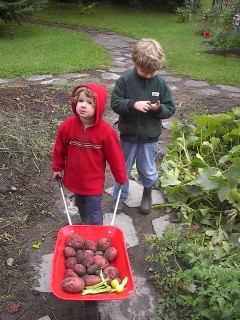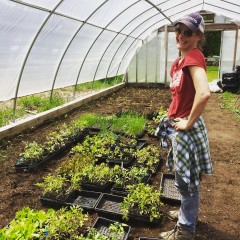CFICE’s Sector-Specific Projects
This page includes a listing of all Community First: Impacts of Community Engagement (CFICE) sector-specific projects to date. Explore our projects by hub by clicking on the specific hub in the list below, scroll through all the projects, or explore our projects through our interactive map.
- Poverty Reduction
- Violence Against Women
- Community Food Security
- Community Environmental Sustainability
- Knowledge Mobilization
Click on a pin to see the project description and collaborators. Sort the map by hub by clicking on a specific hub from the listing at the bottom of the map.
View a full screen version of the CFICE Hub Projects map.
Poverty Reduction (PR) Projects
2015-2016 Poverty Reduction Projects
 Using CCE to Build Capacity for Poverty Reduction
Using CCE to Build Capacity for Poverty Reduction
This project will support the Pathway to Potential and University of Windsor partnership in their efforts to further develop a local poverty reduction strategy for research, evaluation, and policy influence. The project involves consultations with key stakeholders, a comprehensive scan of local resources, and research on relevant CCE models. The work will result in an inventory of existing and potential human and financial resources for supporting poverty reduction work and advocacy in Windsor, Ontario.
Impacting Community Strength and Sustainability: Community-Campus Engagement at Station 20 West
This project examines CCE at the Station 20 West Community Enterprise Centre. The centre is designed to improve quality of life, increase food security, and reduce income and health disparities in an inner city where disadvantage correlates with record-breaking crime statistics, poor political participation, health, and employment outcomes. The study explores the effectiveness of the CCE partnership in supporting innovative capacity building that strengthens inclusive and sustainable communities; the impacts of co-location on service delivery; and the impacts of academic presence on the CCE partnership and service delivery. The study will also support the development of a framework for measuring future impacts and outcomes of the partnership that may be applicable to urban centres across Canada.
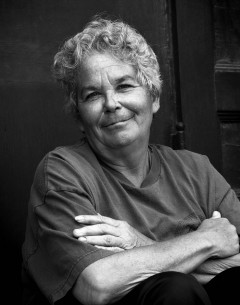 Possibilities for Expanding and Extending Health Care Benefits for All of Ontario’s Low Income Workers
Possibilities for Expanding and Extending Health Care Benefits for All of Ontario’s Low Income Workers
This research project will assess the costs and challenges of extending healthcare benefits to all low-income Ontarians. The research will support the Hamilton Roundtable for Poverty Reduction in their efforts to lobby the Ontario government for extended health benefits that will improve the health of low-income Hamilton communities.
A Road Map to Evaluating Collective Impact in Saint John, New Brunswick
This project supports the development of a road map and report for Living Saint John that will assist them in developing an adaptive, flexible, and iterative evaluation framework suited to a collective impact CCE model. The evaluation framework will allow Living Saint John to evaluate the impacts of their work to break the cycle of generational poverty in Saint John, New Brunswick.
2014 – 2015 Poverty Reduction Projects
Shifting Societal Attitudes Research Project
This research project built on the 2013 ‘Student Attitudes to People Living in Poverty’ project with Opportunities Waterloo Region by revising the research instruments and methods used for data collection in order to develop a community-specific survey. The project used the revised tools to complete a survey in the Waterloo community in order to identify the community’s attitudes towards Canadians living in poverty. From this survey, the project designed and refined strategies for “shifting” these attitudes.
 Living Wage from the Employees’ View
Living Wage from the Employees’ View
In collaboration with the Hamilton Roundtable for Poverty Reduction and the DeGroote School of Business, this project designed and implemented two studies — the first entailed interviewing employers in the Hamilton community regarding the practical experiences and barriers to implementing a living wage; the second entailed interviewing employees to determine their perceptions and experiences with a living wage and the impact it had on their employment (performance and satisfaction) and quality of life.
Focus Groups on Models of Community-Campus Engagement
A gathering in spring 2014 was conducted to convene a “Gathering of Cities Reducing Poverty.” Approximately 50 members of Vibrant Communities Canada attended to learn and reflect on model relationships of Community-Campus Engagement.
Best Practices in Implementing a Living Wage Policy
In collaboration with Carleton University and Vibrant Communities, this project compiled and analyzed the experiences of Living Wage advocates across Canada to suggest best practices on how to convince businesses to implement the Living Wage policy. This project’s goal was to: give cohesion to the Living Wage movement, guide practices for communities appealing to businesses, and add to the base of information on the real challenges and solutions to the Living Wage policy.
 Living Saint John Social Renewal Strategy
Living Saint John Social Renewal Strategy
Since 2012 community stakeholders in Saint John have been developing public will and a community process to define the social priorities for Greater Saint John. This project provided Living Saint John with increased capacity to oversee a community consultation effort to produce and implement a social renewal strategy that clearly identified and championed the most significant social priorities for reducing poverty in the greater Saint John area. This strategy included strategic actions and investments, measureable targets, and an overall collective responsibility for results that lead to an improved quality of life for families, particularly vulnerable families.
2012-2013 Poverty Reduction Projects
Student Attitudes to People Living in Poverty
In collaboration with Wilfrid Laurier University and Opportunities Waterloo Region, this project conducted a survey with Wilfrid Laurier University students to identify deep-seated implicit attitudes towards Canadians living in poverty. The research also sought to identify how the university could “shift” these attitudes and encourage students to engage in new behaviours, with the potential impact of influencing policy makers and politicians to enact legislation that significantly reduces the poverty level in Canada.
 Review of Promise Partnership Initiative
Review of Promise Partnership Initiative
Vibrant Communities Saint John in partnership with University of New Brunswick Saint John (UNBSJ)’s Promise Partnership Initiative, developed a framework to promote the potential benefits of the Promise Partnership Program. This work entailed reviewing the many partnerships and collaborations through the programs offered under Promise Partnership UNBSJ and determining who has been impacted (and how) by the Promise Partnership Program.
Violence Against Women (VAW) Projects
2015-2016 Violence Against Women Projects
Rise Again Project
The VAW hub aims to build a foundation from which to start to rebuild the VAW movement as an advocate for equality-based policy relating to violence against women. The foundation for this work necessarily lies with the community-based front line activists.The project therefore aims to organize and convene a meeting of front line Canadian VAW activists so they can work together to develop an activist VAW strategy for Canada that includes partnerships between front line VAW activists and VAW scholars.
Use of an Intersectional Disability Lens for VAW Work
 Issues around women with disabilities have largely been ignored or siloed in Canadian Studies research and policy initiatives on VAW. This project will develop tools to assist researchers in addressing this gap. The project will use Canadian academic research on VAW published since 2010 to determine whether, to what extent, and in what ways, the research studies are using an intersectional disability lens in their VAW research. The project, which is co-supervised by Disabled Women’s Network Canada (DAWN), will produce a report based on the data collected that will be used as a discussion tool by CFICE VAW hub partners to reflect on and further develop their understanding and use of an intersectional disability lens in their work. The project will also produce an intersectional disability framework to assist VAW researchers.
Issues around women with disabilities have largely been ignored or siloed in Canadian Studies research and policy initiatives on VAW. This project will develop tools to assist researchers in addressing this gap. The project will use Canadian academic research on VAW published since 2010 to determine whether, to what extent, and in what ways, the research studies are using an intersectional disability lens in their VAW research. The project, which is co-supervised by Disabled Women’s Network Canada (DAWN), will produce a report based on the data collected that will be used as a discussion tool by CFICE VAW hub partners to reflect on and further develop their understanding and use of an intersectional disability lens in their work. The project will also produce an intersectional disability framework to assist VAW researchers.
Charging Practices in Ottawa Cases of Domestic Violence
 The issue of police charging practices in domestic violence cases is of much concern in Canada. Through a partnership with the Elizabeth Fry Society of Ottawa and Harmony House, this project will provide detailed information on, and insight into, the experiences of violence against women (VAW) victims who have themselves been charged with domestic violence, with the ultimate goal of eliminating this practice. Combined with other research being done on this issue, this project will provide valuable information that can be used by community and academic partners (both in the VAW hub and beyond) to engage in public discussion of the issue and to advocate for change. This research will inform counselling practice and will provide the basis for policy recommendations and advocacy on behalf of abused women.
The issue of police charging practices in domestic violence cases is of much concern in Canada. Through a partnership with the Elizabeth Fry Society of Ottawa and Harmony House, this project will provide detailed information on, and insight into, the experiences of violence against women (VAW) victims who have themselves been charged with domestic violence, with the ultimate goal of eliminating this practice. Combined with other research being done on this issue, this project will provide valuable information that can be used by community and academic partners (both in the VAW hub and beyond) to engage in public discussion of the issue and to advocate for change. This research will inform counselling practice and will provide the basis for policy recommendations and advocacy on behalf of abused women.
Evaluating the partnership – Interviews with VAW Steering Committee members
For this project, interviews will be conducted with all members of the VAW hub steering committee with respect to their experiences engaging in community /academic partnerships. All VAW steering committee members have extensive experience with these partnerships. The interviews will provide detailed information on the barriers and enablers to engaging in community-campus partnerships.
DVDRC report-Reviewing the Implementation of Recommendations from the Domestic Violence Death Review Committee
This project supported Harmony House and a coalition of community organizations and activists, Action Research Change (ARC), in their work to produce a review of the implementation of recommendations made to different ministries, public services, and other institutions by the Domestic Violence Death Review Committee (DVDRC) of the Office of the Chief Coroner for Ontario between 2007 and 2012. CFICE will assisted with processing information from collected documents and preparing the resulting reviews and reports as needed.
 NWAC database research on Violence Against Aboriginal Women and Girls
NWAC database research on Violence Against Aboriginal Women and Girls
This project will expand and update the Native Women’s Association of Canada (NWAC) database of missing and murdered Indigenous women and girls (MMIWG) on an ongoing basis. This information will enable NWAC to respond to media, government and others regarding MMIWG in Canada, and will inform NWAC’s strategy and policy advice on this issue.
NWAC Materials Update
The Native Women’s Association of Canada (NWAC) database will be used as the basis for a report on the missing and murdered Indigenous women and girls. This report and NWAC’s database information will assist NWAC in their participation in the Inquiry into MMIWG — both in terms of factual information that supports a systemic analysis of the issue and as the basis for policy recommendations, recommendations for service provision, and an analysis of the public discourse and the myths and stereotypes that underlie much of it.
2013-2014 Violence Against Women Projects
 Documenting the stories and experiences of long-time violence against women activists in Ontario
Documenting the stories and experiences of long-time violence against women activists in Ontario
In collaboration with Harmony House, this project documented, through video-taped interviews, the experience and knowledge of five long-time VAW activists in Ontario. These women, who were founders of the feminist anti-violence movement in Ontario, are now retiring or have already retired from their paid work in the movement. These oral histories capture the wisdom of key figures in the Ontario VAW movement and documents their experiences as advocates, the lessons learned, and their practical and theoretical understandings of the work they did.
Picking up from where we left off: Core documents of the 90’s Canadian VAW Movement
In collaboration with the Vancouver Rape Relief and Women’s Shelter, this project collected relevant policy pieces, VAW movement documents and knowledge from the last active period of the Canadian VAW movement (mid to late 1990s) in order to develop a comprehensive and accessible database of important documents and policy pieces (database still to be developed). The goal of this project is to preserve a detailed history of the last period of concerted activity (activists, policy makers and academics) on VAW in Canada so as to provide a base for renewed action. The database, once developed, will be accessible to students, activists, academics and policy makers and will be accompanied by a report written on the chronology of events and their significance.
Community Food Security (CFS) Projects
2015-2016 Community Food Security Projects
Revisiting the Cross-Cultural Food Networks: Building and Maintaining Inclusive Food Security Networks to Support Indigenous and Non-Indigenous Communities
This project will revisit and build on the Cross-Cultural Food Networks: Building and Maintaining Inclusive Food Security Networks to Support Indigenous and Non-Indigenous Communities project which studied enablers and barriers to cross-cultural dialogues between the BC Food Systems Network (and food movement) and Indigenous and non-Indigenous networks, projects, organizers, and agencies.
2014-2015 Community Food Security Projects
 Sharing the Table Manitoba
Sharing the Table Manitoba
This project supported research conducted by Sharing the Table Manitoba on the role of government regulations, policies and programs in shaping the development of local sustainable food systems in the Province of Manitoba. The resulting report was shared with government offices, including Manitoba Agriculture Food and Rural Development (MAFRD), to encourage the development of food-related policies and programs that increase community food sovereignty in the province.
Paying for Nutrition
In collaboration with Food Secure Canada, Mt. St. Vincent University, and Lakehead University, this project renewed the work on food costing in Northern Canada so that food costing numbers accurately reflect the reliance on traditional / country foods to meet food needs. Food costing involves gathering the prices of different foods to assess the cost of eating a basic healthy diet. This work will support food sovereignty activism in Northern Canada towards the development of better and more realistic food policies.
2013-2014 Community Food Security Projects
Regina Community Food Assessment
This project examined the partnership between the Regina Community Food System Steering Committee and the University of Regina, and carried out action research to expand this partnership in mutually beneficial ways.
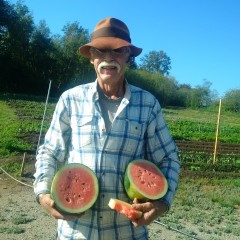
Glen Flet, from the L.I.N.C. Society (a CFICE partner), shows off the fresh watermelon picked from Emma’s Acres.
A Developmental Evaluation to Explore a Budding Community/Academic Collaboration Examining How Offenders and Ex-Offenders Facilitate a Healthy, Sustainable Community Food System
Through a collaboration between L.I.N.C. and CRiHHI (UBC’s Critical Research in Health and Healthcare Inequities), this project examined the impacts of the food provision system on the food relationships of individuals transitioning out of incarceration. This study also looked at the social and cultural barriers and facilitators of relationships between campus and community to determine how existing community-campus relationships may be fostered to maximize the value for all stakeholders.
Creating a Food Hub Through University-Community Partnership
This project supported a developmental evaluation of the Research Shop‘s collaborative work on community food security in Guelph-Wellington to date and supported the development of The Seed–a type of community food hub–in Guelph-Wellington.
Edible Campus: From Showcase to Living Classroom
The Edible Campus project provided funding to evaluate Santropol Roulant‘s edible campus partnership with McGill University’s School of Architecture, which features an on-campus, “live classroom” community garden housed by the university. The evaluation supported the partnership in clearly articulating the impacts, potential, and possibilities for replication and scaling up of the Edible Campus program.
 Planning for Change: Community Development in Practice
Planning for Change: Community Development in Practice
This project funded a partnership project between a University of Toronto graduate service learning course and Sustain Ontario‘s People’s Food Policy (PFP) group. The project focused on exploring ways to improve the PFP’s influence on provincial and federal policy food initiatives by deepening the evidence base for their work.
Further information on the 2013-2014 CFS projects can be found on Food Secure Canada’s website.
2012-2013 Community Food Security Projects
Local Food Multipliers and Accessibility in Northern Ontario
This project partnered with a marketing class at Lakehead University to investigate local food production supply, demand, and its multiplier effect on the workforce throughout the economy in Northwestern Ontario. The project also worked with two social work classes at Lakehead University, the Food Security Research Network, and local food producers and processors to co-develop community capacity building practices with respect to food production and distribution.
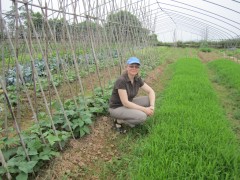
Steffanie Scott, a CFS Hub collaborator, crouches near some vegetables she is growing. ©Steffanie Scott
Models of Community University Collaboration in the Waterloo Region Food System
In collaboration with Region of Waterloo Public Health and the University of Waterloo, this project provided funding for research on how organizations can play the role of catalysts in the development of healthy local food systems. The study documented ad hoc models, key roles of participant organizations, and organic processes of CCE in the creation of a healthy local food system in Waterloo Region.
Cross-Cultural Food Networks: Building and Maintaining Inclusive Food Security Networks to Support Indigenous and Non-Indigenous Communities
Using a program evaluation approach, this project studied enablers and barriers to cross-cultural dialogues between the BC Food Systems Network (and food movement) and Indigenous and non-Indigenous networks, projects, organizers, and agencies. The project outlined the successes and challenges of building cross-cultural relationships around the unifying need for adequate, just, healthy, culturally-appropriate food, providing both researchers and community organizers with tools and ideas for developing more meaningful and effective cross-cultural collaborative projects.
 Campus Food Initiative Study
Campus Food Initiative Study
With Meal Exchange, this project analyzed successful food projects on Canadian campuses to determine the elements that make a campus project successful across campuses, and across projects. The project interviewed project coordinators/leads (including students, faculty, and staff who have been involved in an initiative) to identify enabling factors and obstacles to on-campus and off-campus partnerships in campus food projects.
Further information on the 2012-2013 CFS projects can be found on Food Secure Canada’s website.
Community Environmental Sustainability (CES) Projects
2014-2015 Community Environmental Sustainability Projects
Active Neighbourhoods
In collaboration with GreenUP, this project supported the efforts of the Active Neighbourhoods Canada project by working with low-income residents of a Peterborough neighbourhood to increase their engagement in a community planning process around redeveloping public space. This redevelopment includes reimagining spaces in ways that accommodate pedestrians, cyclists, and vehicles.
Influencing the “Deep Green” Development of the Oblate Lands in the Old Ottawa East
In collaboration with Sustainable Living Ottawa East (SLOE), Regional Group and Enbridge representatives, this project funded a workshop on low impact development (LID) (i.e. developing affordable housing with a high level of energy efficiency). The workshop encouraged the developer of Greystone Village (an 11 hectare property in Old Ottawa East), the City of Ottawa, and RVCA staff to develop LID opportunities and prepare a District Energy Systems business plan for the Greystone Village property. This work will hopefully lead to the development of housing that is both affordable and “green.”
2013-2014 Community Environmental Sustainability Projects
OETN (Ottawa EcoTalent Network) – Business Plan Development and Implementation
This project conducted research on how to increase the OETN‘s CCE engagement with local post-secondary institutions. The project also provided the OETN with research assistant capacity to assist with the development of the organization’s website and engagement strategy, and to provide key support in the development of a Trillium grant. With the RA’s support, the project won a Trillium grant that will support an OETN Executive Director for three years.
CES Database/Battawa
This project funded the development of a community environmental sustainability (CES) activities database to facilitate collaboration across faculties and disciplines at Carleton University. The database provides information on key Carleton University CES faculty members and CES-related activities and research being conducted on Carleton University’s campus. This project also provided funds for an RA to conduct an analysis of the partnership between Carleton University and the Batawa Development Corporation.
2012-2013 Community Environmental Sustainability Projects
Establishing the Potential for “Deep Green” Development of the Oblate Lands in Old Ottawa East
In collaboration with Sustainable Living Ottawa East (SLOE), this project researched and developed a business case (and other products) on ways to maximize environmental, social, and cultural sustainability and vitality in the development of a 12 hectare property in Old Ottawa East (currently owned by the Oblates of Mary Immaculate and the Sisters of the Sacred Heart). The business case was presented to the developers with the hope that some, if not all, the site-appropriate sustainability infrastructure and design options would be incorporated into the final development design.
Regional Approaches to Environmental, Social and Economic Innovation
With the Community Opportunity and Innovation Network (COIN), this project researched governance models for ‘centres for social, environmental and economic innovation’; completed a market needs assessment for the establishment of a Peterborough Centre for Social Innovation (PCSI); and documented the parallels between movements to create two similar centres for social, environmental and economic innovation in the Peterborough and Haliburton regions.
Community-University Partnerships in Strategic Planning
In collaboration with Trent University and U-LINKS, this project studied the ways in which CCE contributes to strategic planning in environmental organizations. The project provided funding to hire RAs to work collaboratively with Haliburton Highlands and Abbey Gardens on projects that further developed Haliburton Highlands’ plan to protect the natural heritage of Haliburton County and Abbey Gardens Community Trust’s plan to secure agriculture, energy and financial sustainability for Haliburton County.
Knowledge Mobilization (KMb) Projects
2014-2015 Knowledge Mobilization Projects
Embracing community outcomes: Using student engagement as knowledge mobilization
In collaboration with several community partners and the University of Victoria, this project examined student experiences of community campus engagement, and specifically looked at how student engagement can enhance knowledge mobilization efforts for, and between, communities, students, and universities.
 The Role of Intermediaries in Facilitating Reciprocal Relationships between Campus and Community
The Role of Intermediaries in Facilitating Reciprocal Relationships between Campus and Community
Volunteer Canada and the University of Ottawa’s Centre for Global and Community Engagement explored the theme of reciprocal community-campus relationships and the role that intermediary organizations play in facilitating these mutually beneficial connections. This project involved the development of a background paper, two round-table discussions, and a guide on “brokering” for these intermediary organizations.
Regenerating Community Sustainability through Student Engagement
In collaboration with the McMaster Centre for Engineering and Public Policy, this project deployed students in community organizations around the greater Toronto area (including Hamilton) to work collaboratively on overcoming challenges to regenerating livable cities. Urban regeneration (also known as urban revitalization) entails improving physical and economic structures in city neighbourhoods to fight urban decline. Through this project, CFICE sought to develop models of sustainable community capacity building.
 Closing the Loop: A Ravens’ Den Proposal
Closing the Loop: A Ravens’ Den Proposal
This project developed an evaluation framework to study the experiences of community partners involved in a community-engaged learning project with the Carleton University Sprott School of Business. The project collected community partner feedback on the conduct of Sprott students, the value of their involvement in the project, and their use of student recommendations. From this feedback, the project generated recommendations for improving both student and instructor involvement in community-engaged pedagogy, and developed “success stories” to help promote Sprott’s community-engaged learning project.

